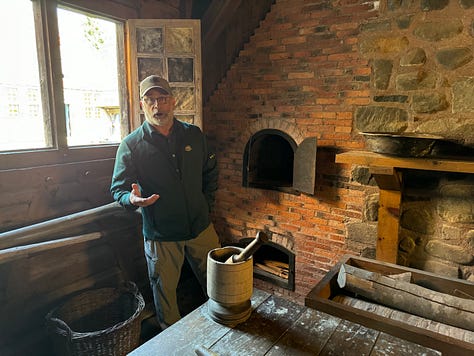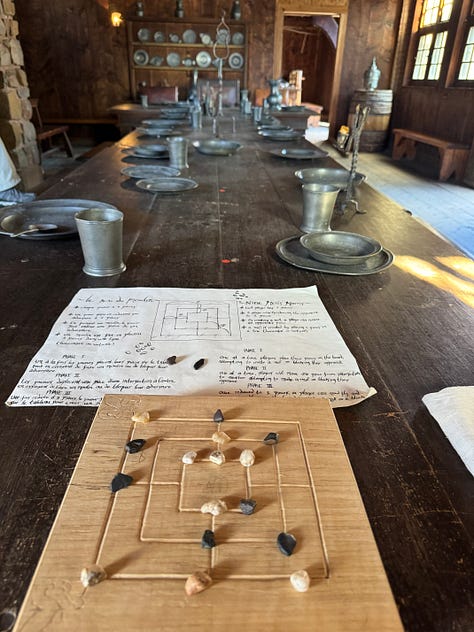Does 1,000 words really have to be 1,000 words?
Plus: Join The Pitching Power Hour on Tuesday, Oct 1st.
The Clothesline is read by hundreds of writers across Canada, as well as the US, the UK, Europe, and Australia. Please share with your writing friends who love working on their freelance business and share our passion for books, reading, travel, art, ideas, and nature.
Hello from my cozy office in Ottawa. I’m just back from a press trip to Nova Scotia and about to head out on another one to Quebec’s Eastern Townships. As such, I’m in the thick of things with pitching and writing – probably just like you! I’m hoping information on the nitty gritty of assignment details (below) will help with one of your upcoming assignments. (And I’m including some pics here of my time this week at Port-Royal National Historic Site and a nearby winery for a little fun).
But first… some housekeeping.
Our next pitching power hour is next week! Pro-members, I’ll see you on Tuesday, October 1 at 9:00 AM. Your link is at the bottom.
Want to be a part of the pitching power hour each month? Upgrade your subscription here. The cost is about $7 Cnd/$5 US a month and you save a lot with annual plans.
Save the date! My 2025 planning workshop will take place on Friday, December 6th! Ticket sales coming soon.
Curious about what it’s like to work with me via one-on-one coaching? Book a free 15 minute discovery call to find out!






Food For Thought
Does 1,000 words really have to be 1,000 words?
This is the gist of a question a coaching client and I discussed in a recent call. Just how firm are word counts? How much flexibility do you really have? Do you include headings and subheadings in that count?
These are the things that no one ever really tells you when you start out as a freelancer, yet it’s important information, the kind of basics that impact your daily workflow. Here’s what you need to know about freelancing and word counts.
If an editor gives you a range, stick to that range. If you’re told 1,000 to 1,200 words, respect that. Don’t turn in a piece that’s 925 words or 1,275. You either need to add an additional source or point of view or cut one entirely.
If the editor gives you a firm number, try to come in right on budget but allow yourself a 5% grace. It probably doesn’t matter that much if you turn in 962 words or 1,039.
Think of the format. Print publications are planned out months in advance and a few extra lines here and there really do matter. Digital articles have a bit more flexibility.
Save your early drafts. You never know when an editor wants more or less and you’ll regret deleting that extra paragraph or alternative conclusion.
Do titles matter? I personally don’t include titles in my word count but I do include the sub-headings. Titles are given their own allotment of space in a print piece but sub-headings are part of the main piece and therefore I include them.
Don’t fluff it up. You’re a professional and every sentence you write should be tight, purposeful. If you are under your word count, don’t start looking for ways to make your sentences longer. Ask a friend to read through it and ask them what aspect of the piece could benefit from extra material.
Invoice at the agreed upon word count. If you said $.50 a word for 1,000 words, you bill $500 regardless of whether you’re at 978 words or 1,063. However, if an editor asks for extra info (“Could you put in a paragraph about the history of the community…”), get fresh clarification about the word count (“Do you want me to extend the word count to about 1,250 words with this new paragraph or do you want me to cut something else to keep it at 1,000? If so, what should be trimmed back?”) If they say they want to increase the word count, that means you should get more money. Suddenly the piece is about 25% longer and your pay should reflect that.
Got extra material from sources and research that you just can’t fit into the finished piece? Don’t lament it. Use it! Those extra quotes from a maple farmer that you couldn’t use in your piece about local food might work great in a round up of things you should know about Canada. It’s a good practice to check in with a source to ensure they’re okay with you using their words once more after the fact (or, even better, tell them at the beginning that you hope to do a second piece if you can’t use the entirety of the interview in your current assignment).
Keep reading with a 7-day free trial
Subscribe to The Clothesline by Vanessa Chiasson to keep reading this post and get 7 days of free access to the full post archives.




